
7 Reasons Why Is Milk Good for Dogs: Essential Insights for Pet Owners
Overview
As pet owners, we often find ourselves wondering about the best choices for our furry friends, and the question of whether milk is good for dogs is a common concern. While some dogs may enjoy a small amount of milk, it’s essential to recognize that many dogs are lactose intolerant, which can lead to uncomfortable digestive issues. This is a widespread issue among our canine companions, and it’s understandable to feel worried about their well-being.
Veterinarians emphasize the importance of observing our pets closely and introducing dairy into their diets with care, ensuring we protect them from potential health risks. By being mindful and taking the time to understand our dogs’ needs, we can make informed decisions that contribute to their overall happiness and health.
Introduction
The discussion about whether milk is suitable for dogs has touched the hearts of many pet owners over the years, often leaving them pondering the best dietary choices for their cherished companions. While countless dogs may delight in the creamy flavor of milk, it’s important to recognize that not all canines can safely enjoy this beloved treat due to differing levels of lactose tolerance. This article aims to explore the nutritional benefits and potential risks associated with milk for dogs, providing essential insights that can empower pet owners to make informed decisions.
Can a little splash of milk truly enrich a dog’s diet, or might it lead to uncomfortable digestive troubles? Understanding these nuances is vital for ensuring the health and happiness of our beloved pets.
Jet Pet Resort: Tailored Pet Care and Milk Considerations for Dogs
At Jet Pet Resort, we truly understand that your beloved pet deserves personalized care, especially when it comes to their dietary needs. Each dog is unique, and we recognize the importance of tailored diets that may include delightful snacks like dairy. Knowing how milk fits into your dog’s diet is essential for providing them with the best possible care, particularly in understanding if milk is good for dogs, and we empathize with your desire to ensure their happiness and health. Veterinarians often emphasize that a balanced diet, which can safely incorporate dairy options, raises the question of whether milk is good for dogs, as it plays a significant role in enhancing a dog’s overall well-being.
Our luxurious dog boarding services, starting at just $66.95 per night, are thoughtfully designed to cater to the specific preferences and health requirements of each dog. This reflects the growing trend in luxury pet care toward customized services that prioritize your pet’s individual needs. Additionally, we offer action-packed daycare and grooming services, ensuring a fun-filled experience that contributes to your pet’s happiness and vitality.
We know that modern pet owners, like you, prioritize quality and individualized care, and we are here to support you in that journey. Our commitment to your furry companions goes beyond mere services; it’s about creating a nurturing environment where they can thrive. Together, let’s ensure that your pet receives the love and attention they deserve.
Can Dogs Drink Milk Safely? Understanding the Basics
Dogs can indeed enjoy dairy, but it’s essential to approach this with care. While many dogs find milk delightful and it is generally safe, it is important to consider whether milk is good for dogs, as each dog’s tolerance can vary widely. Some may savor small amounts without any issues, while others might experience discomfort, such as diarrhea, gas, or bloating. Research shows that many adult dogs lose the ability to produce enough lactase, the enzyme needed to digest lactose, which can lead to lactose intolerance. Symptoms of this condition can include loose stools and vomiting after consuming dairy products. Additionally, the higher fat and sugar content in dairy can pose risks, such as obesity and pancreatitis, when consumed in excess.
To safely introduce dairy into your dog’s diet, follow these steps:
- Start with a small amount—typically a teaspoon for smaller breeds and a few tablespoons for medium to large dogs.
- Observe how your dog reacts; if any negative symptoms emerge, it would be wise to avoid dairy in the future.
- Many veterinarians suggest that if your dog shows no signs of lactose intolerance, occasional treats of plain yogurt or certain cheeses might be better tolerated than dairy itself, leading to the question of whether milk is good for dogs.
- Exercise caution with plant-based beverages, as some may contain xylitol, which is harmful to dogs.
Ultimately, while some pets may enjoy a little dairy, the potential risks often outweigh the benefits. Water is the safest and most nourishing choice for hydration, as many experts emphasize. Following the 10% rule for treats can help keep your dog’s diet balanced and healthy. As always, consulting with a veterinarian can provide personalized guidance tailored to your dog’s specific dietary needs, ensuring their well-being and happiness.
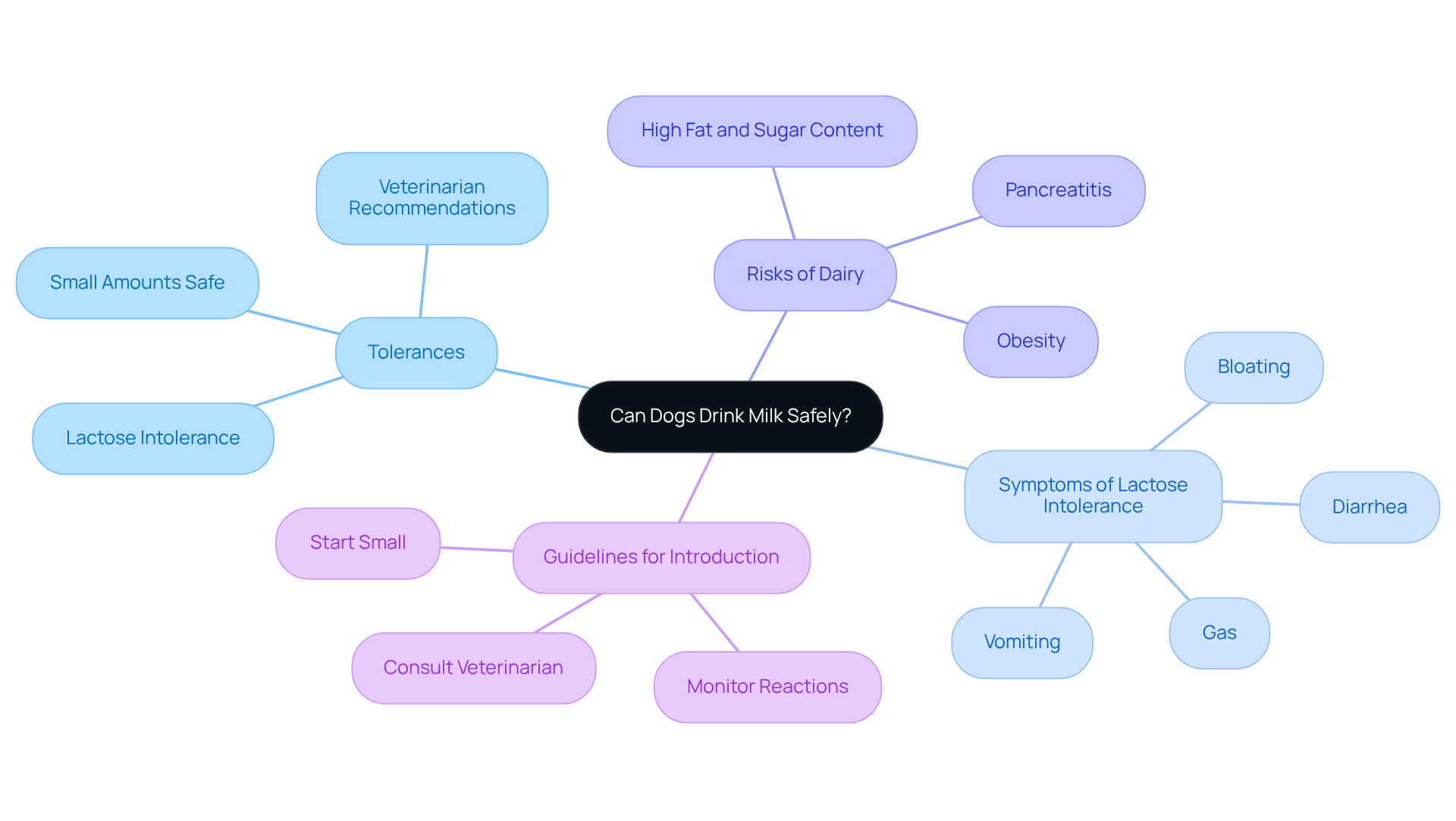
Lactose Intolerance in Dogs: Signs and Implications
Lactose intolerance is a common issue for our beloved canines, marked by their difficulty in digesting lactose, the sugar present in milk. Many dogs, especially those not of European descent, may not produce enough of the enzyme lactase, which is crucial for breaking down lactose. If your furry friend experiences symptoms such as:
- Diarrhea
- Vomiting
- Gas
- Bloating
—often appearing up to 48 hours after consuming milk products—it’s important to take action. Removing milk products from their diet and consulting a veterinarian for suitable alternatives can make a world of difference. A gentle suggestion is to conduct a 30-day elimination trial to observe any changes in their symptoms.
While only about 0.2% of dogs suffer from food allergies, milk products are still among the most common allergens, alongside beef, chicken, and wheat. This highlights the importance of paying close attention to how your dog reacts to milk-based items. Some breeds may manage small amounts of milk without issue, while others could face significant digestive discomfort. A thoughtful approach is to gradually introduce milk products, allowing you to assess their tolerance levels. You might consider testing for lactose intolerance by offering a small serving of milk each day for three days.
Veterinarians stress the importance of being attentive to your dog’s dietary reactions. Recognizing the signs of lactose intolerance is vital for ensuring your pet’s health and comfort. If your dog shows signs of digestive upset after consuming milk products, it may be time to explore lactose-free options or plant-based alternatives, ensuring a balanced and enjoyable diet for your cherished companion. Additionally, it’s worth noting that certain breeds, particularly those of European descent, may retain the ability to produce lactase into adulthood, enabling them to tolerate dairy better than others.
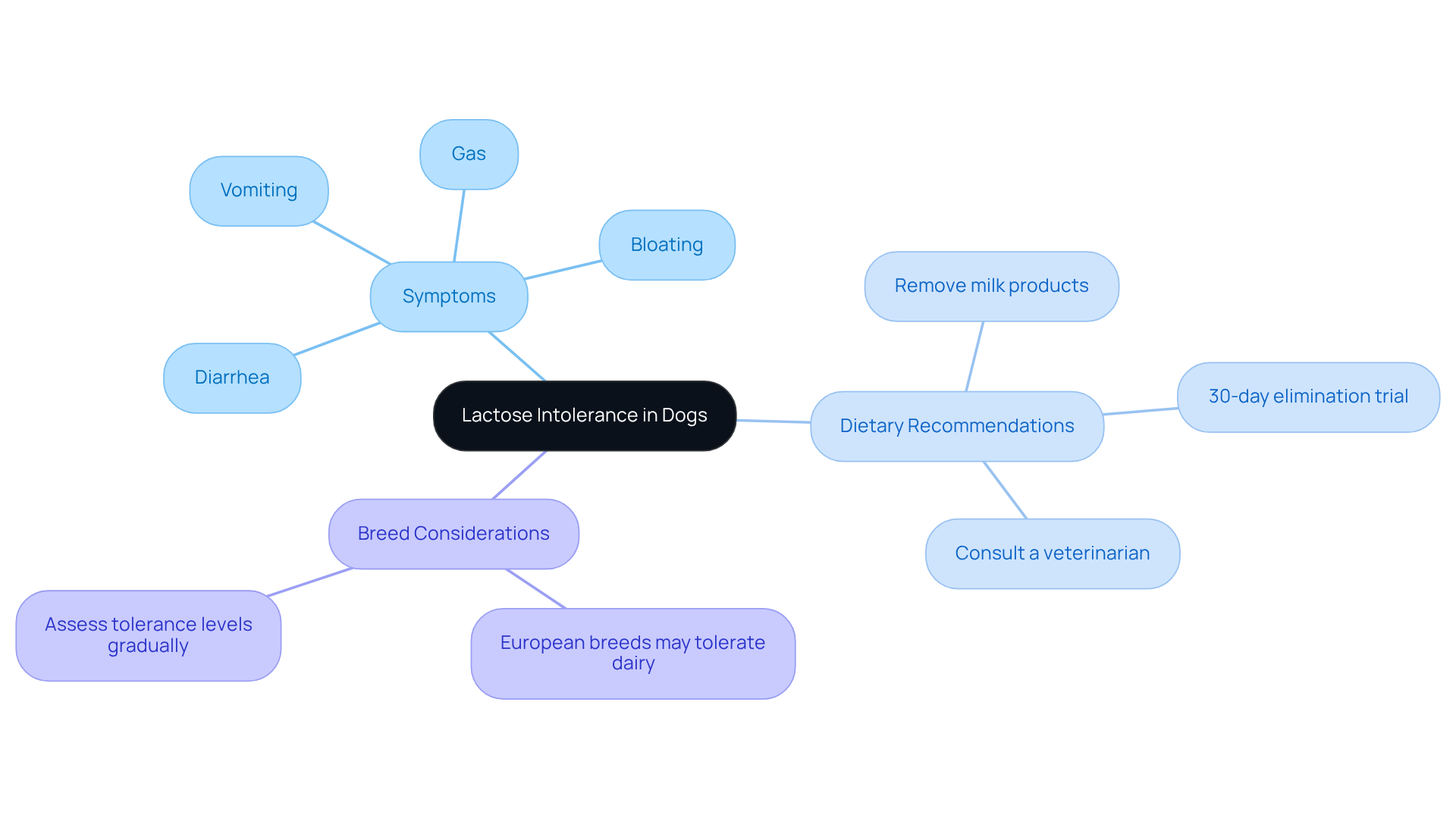
Nutritional Benefits of Milk for Dogs: What to Know
As pet owners, we naturally want the best for our furry friends, which leads us to ask, is milk good for dogs as a wholesome treat? It offers various nutritional benefits, such as essential protein, calcium, and vitamins A and D, all of which contribute to bone health, muscle function, and overall development. However, it’s important to remember that most dogs get these vital nutrients from a well-balanced commercial diet. This makes dairy more of an occasional treat rather than a dietary staple.
While many dogs may enjoy a small amount of dairy, it’s crucial to be mindful of moderation. Excessive intake can lead to digestive issues, particularly in those who are lactose intolerant. This condition can manifest even after consuming just a little dairy, which can be concerning for any pet owner. Therefore, keeping dairy treats to a minimum is essential, and focusing on a balanced diet will help meet your pet’s nutritional needs.
If you notice any signs of lactose intolerance after your dog consumes dairy, such as upset stomach or discomfort, it’s wise to consult a veterinarian. They can provide guidance tailored to your pet’s specific situation. And remember, always ensure that fresh water is readily available—it’s the best choice for keeping your canine hydrated and healthy.
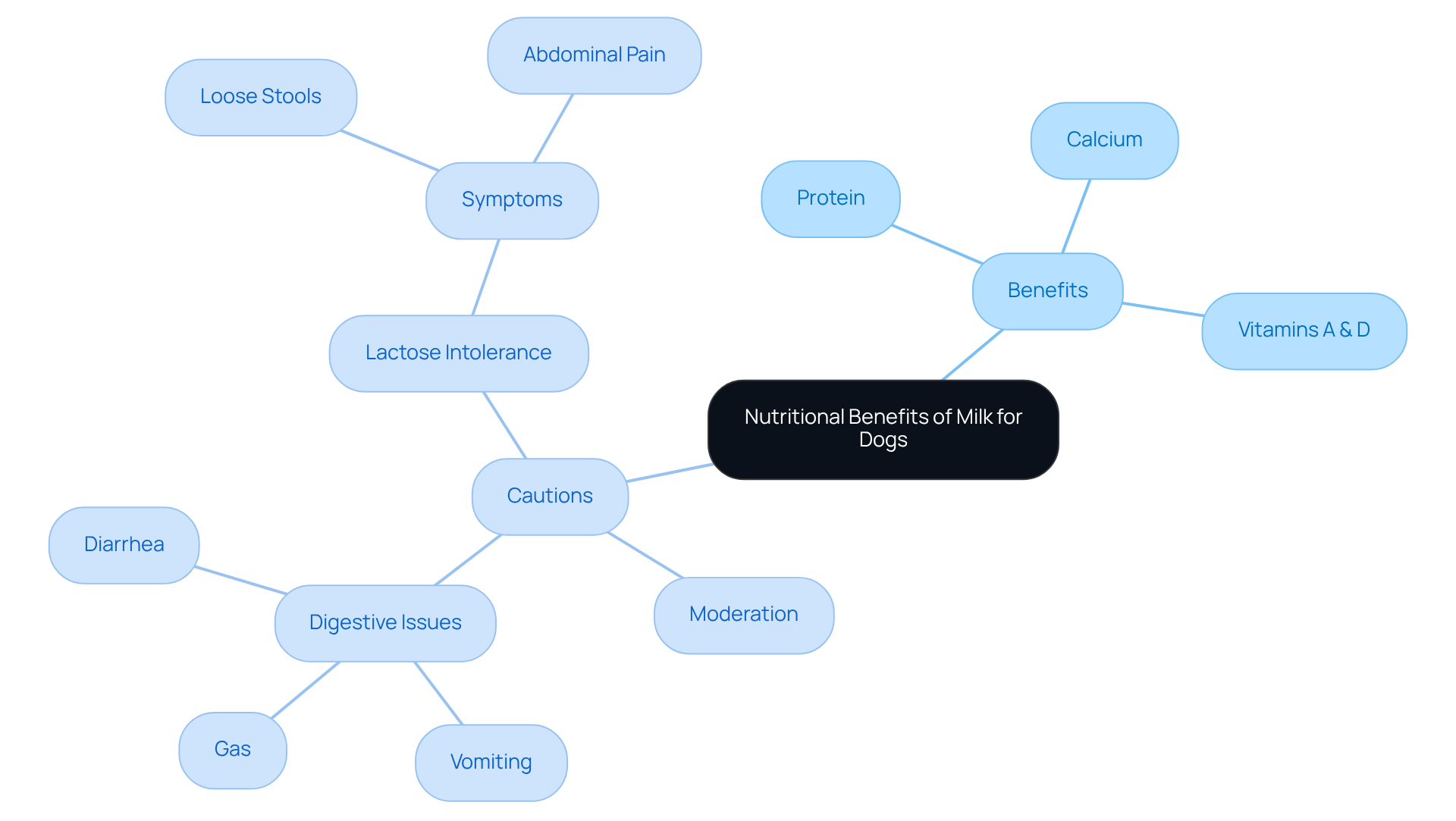
Milk Alternatives for Dogs: Safe Options to Consider
If your beloved dog is lactose intolerant or sensitive to dairy, it’s completely understandable to be concerned about their beverage choices. The good news is that there are several safe and wholesome alternatives available. You might consider:
- Lactose-free cow’s beverage
- Goat’s beverage
- Delightful plant-based options like almond or oat beverages
These can serve as suitable substitutes that cater to your furry friend’s needs.
However, it’s essential to ensure that any alternative you choose is free from harmful additives, such as sweeteners or flavorings. Your dog’s health is a priority, and consulting with a veterinarian before introducing new foods into their diet can provide peace of mind. Remember, you’re not alone in this journey; many pet owners share your concerns and want the best for their companions. Together, we can make informed choices that nurture their well-being.
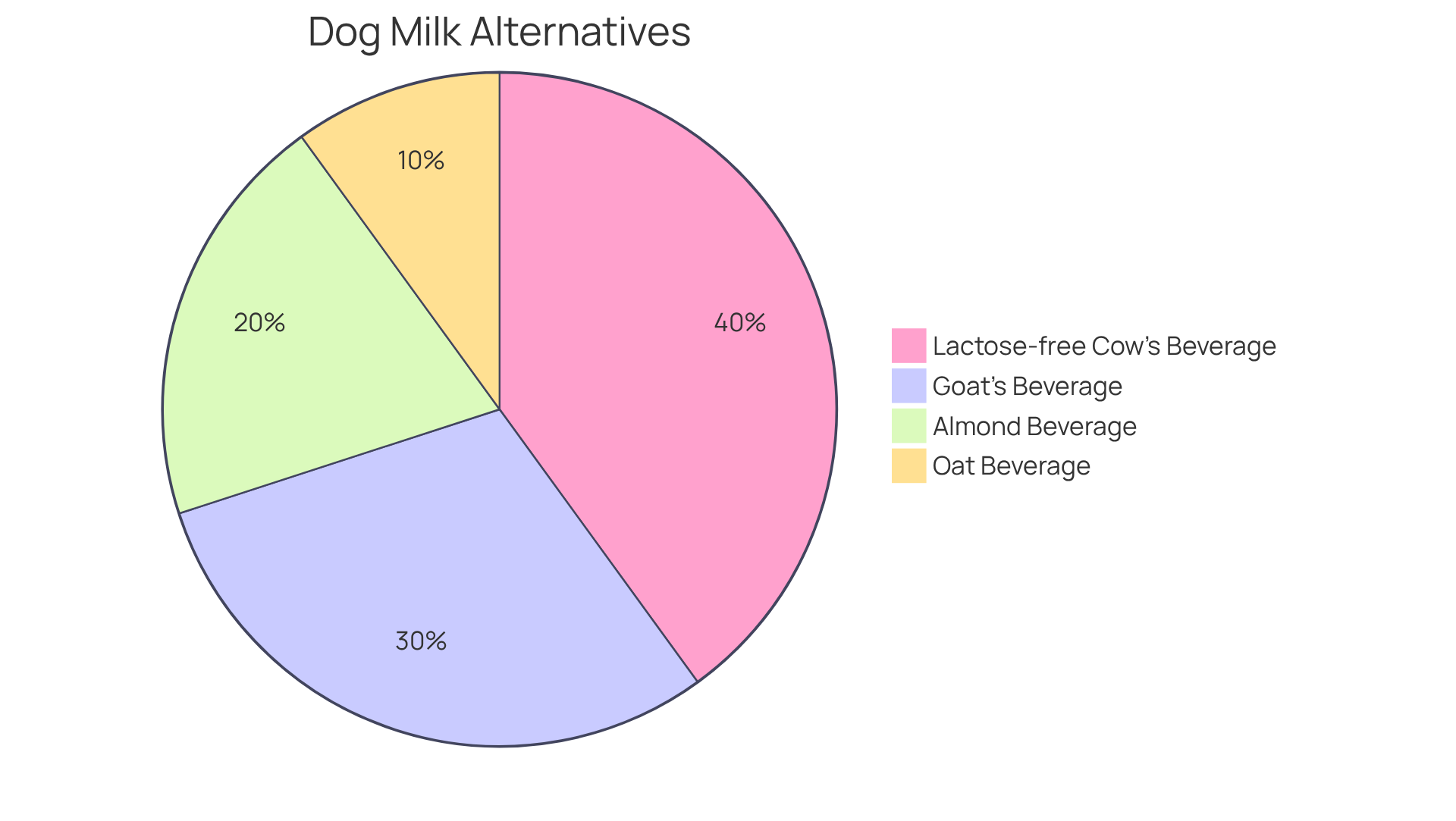
How Much Milk Can Dogs Drink? Guidelines for Pet Owners
When considering the addition of dairy to your dog’s diet, it’s crucial to ask if milk is good for dogs. It’s understandable to want the best for your furry friend, and a general guideline suggests offering no more than a few tablespoons of liquid daily, tailored to your dog’s size.
For our smaller companions, one tablespoon is often sufficient, while larger dogs might be able to enjoy up to a quarter cup. It’s important to remain attentive; veterinary specialists recommend watching for any signs of discomfort after your dog consumes dairy products, as they often discuss whether milk is good for dogs, given that each pet’s dietary needs can vary significantly.
Dr. James St. Clair, a caring veterinary surgeon, wisely emphasizes, “Adjusting the serving size based on your dog’s reaction is vital to ensure a safe and enjoyable experience.” Additionally, pet care facilities encourage us to understand each dog’s unique dietary requirements, reminding us that what works for one dog may not be suitable for another.
As a practical suggestion, keep a close eye on your dog’s behavior and health after introducing dairy, and be prepared to adjust the serving size as needed. Your attentive care can make all the difference in ensuring a happy and healthy experience for your beloved pet.
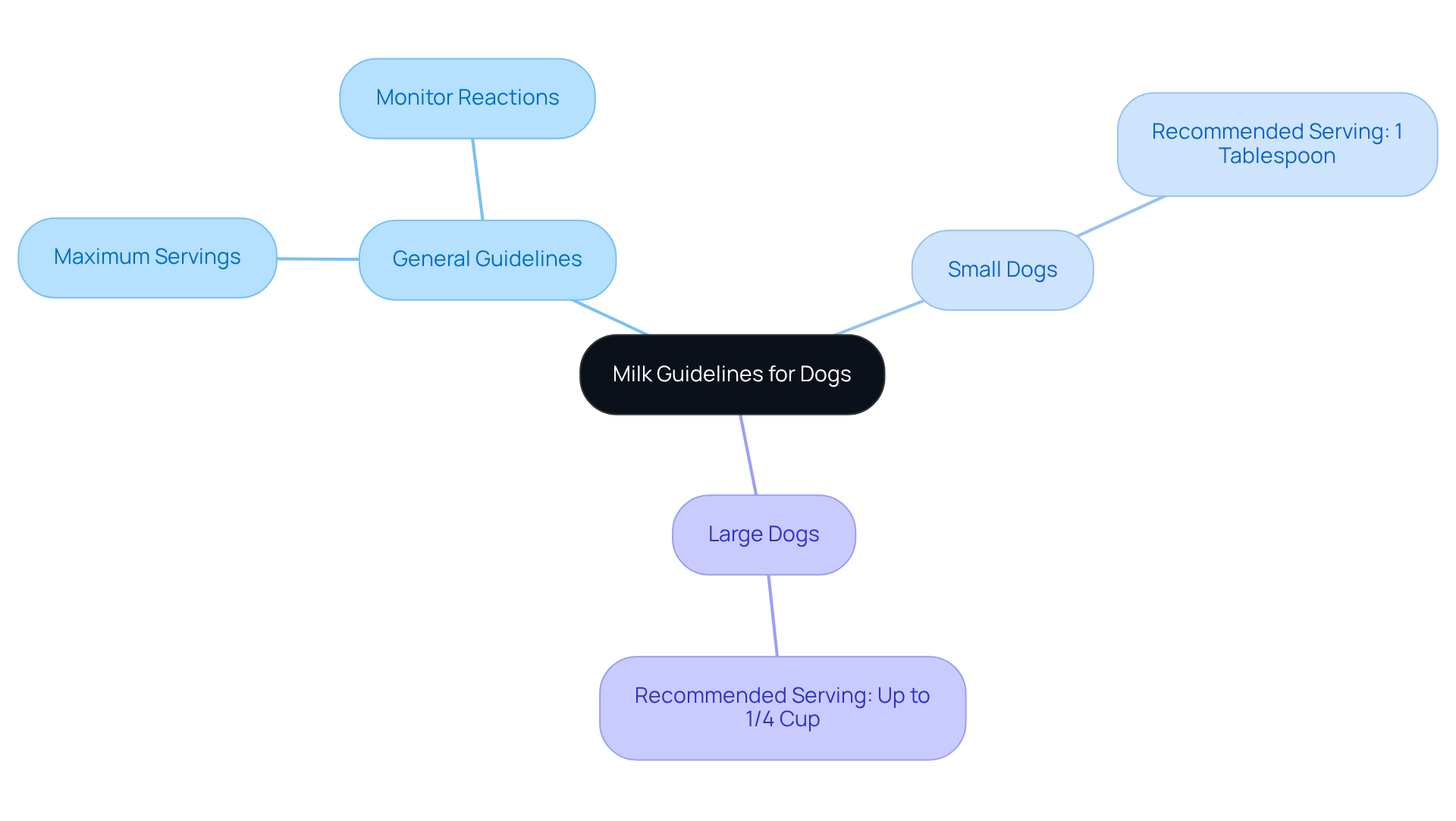
Why Do Dogs Love Milk? Understanding Canine Preferences
Dogs often find themselves drawn to dairy, captivated by its rich flavor and creamy texture, which can remind them of the comforting experience of nursing as puppies. This attraction is rooted in their evolutionary background as opportunistic scavengers, where high-fat foods were a precious resource.
It’s heartening to know that research shows canines possess a natural inclination towards dairy products, although this preference can differ from one dog to another. While many dogs delight in the taste of dairy, it’s crucial for pet owners to consider whether milk is good for dogs and the potential health implications. Since a significant number of dogs are lactose intolerant, it raises the concern of whether milk is good for dogs, as it can lead to uncomfortable symptoms such as vomiting, diarrhea, and gas.
Therefore, treats, including milk, should be offered in moderation to prevent any digestive upset, as the question of whether milk is good for dogs remains important. Additionally, certain milk-based items like cheese and yogurt may be more easily tolerated by some dogs. Fermented dairy products, such as yogurt and kefir, can also be beneficial for gut health.
By balancing their enjoyment of these treats with health considerations, we can ensure that they contribute positively to our furry friends’ overall well-being.
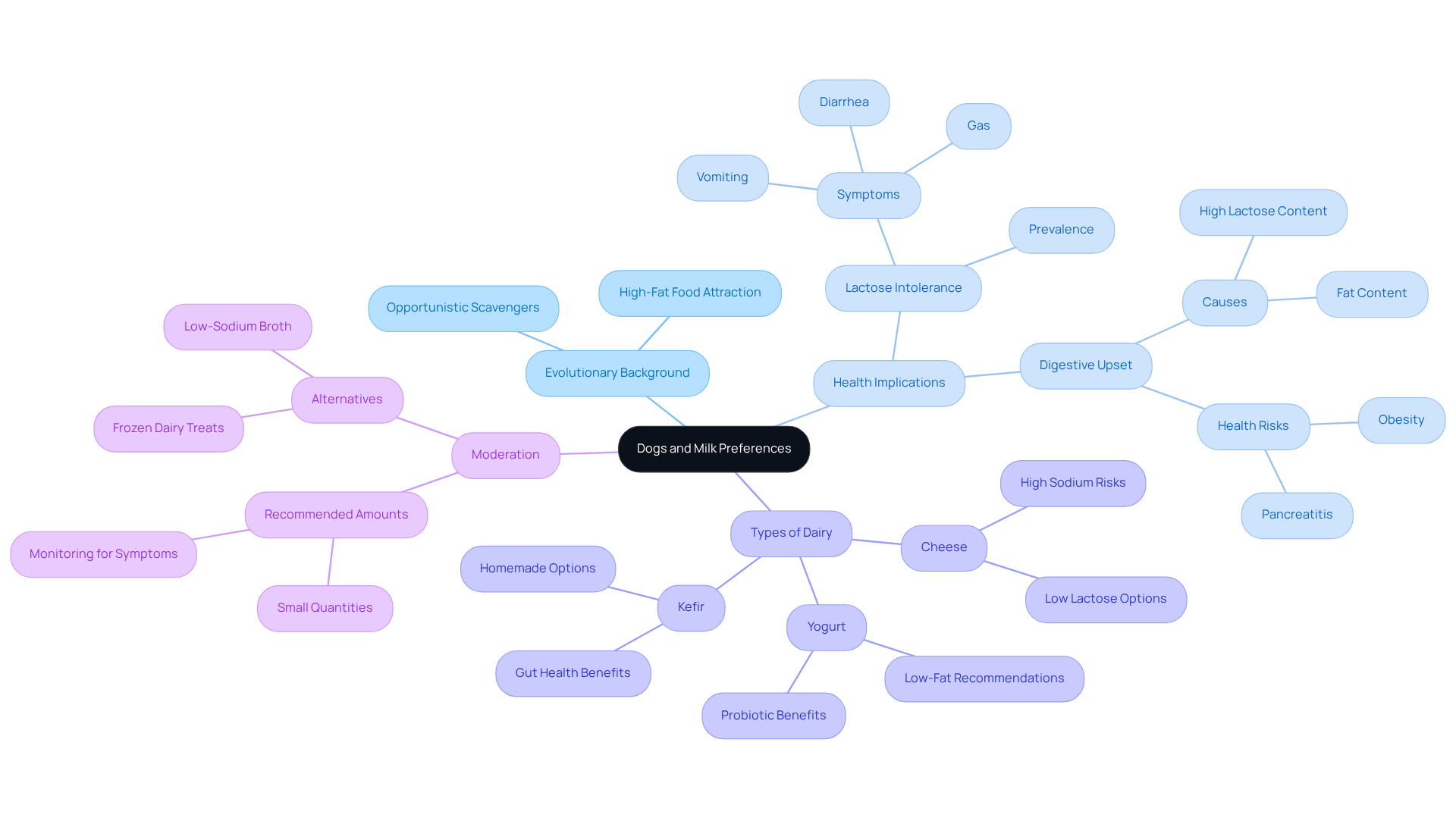
Potential Risks of Feeding Milk to Dogs: What to Watch For
While dairy can be a delightful treat for some dogs, it’s important to recognize the potential risks involved when determining if milk is good for dogs. Overindulgence can lead to serious health issues such as obesity, pancreatitis, and gastrointestinal distress, especially in lactose-intolerant dogs, which make up about 70% of the canine population. If your furry friend experiences symptoms like diarrhea, bloating, gas, or vomiting after consuming dairy, it’s crucial to pay attention and consult your veterinarian regarding if milk is good for dogs. Many pet owners wonder if milk is good for dogs, as they find that goat’s milk may be easier for their dogs to digest when offered in moderation.
As you consider if milk is good for dogs when incorporating dairy into your dog’s diet, remember that treats—including dairy products—should make up no more than 10% of their daily caloric intake. Prolonged exposure to dairy can lead to ongoing health concerns, raising the question of whether milk is good for dogs, such as skin inflammation and immune system stress. Therefore, moderation is key. Start with small amounts and observe your dog for any adverse reactions before deciding if milk is good for dogs as a regular part of their diet. If you decide to offer your dog dairy, begin with just a teaspoon, monitor them for 24 hours, and always avoid using it as a meal substitute, as advised by Dr. Jenny Monroe. Your dog’s well-being is paramount, and being mindful of their dietary choices is a loving step towards ensuring their health and happiness.
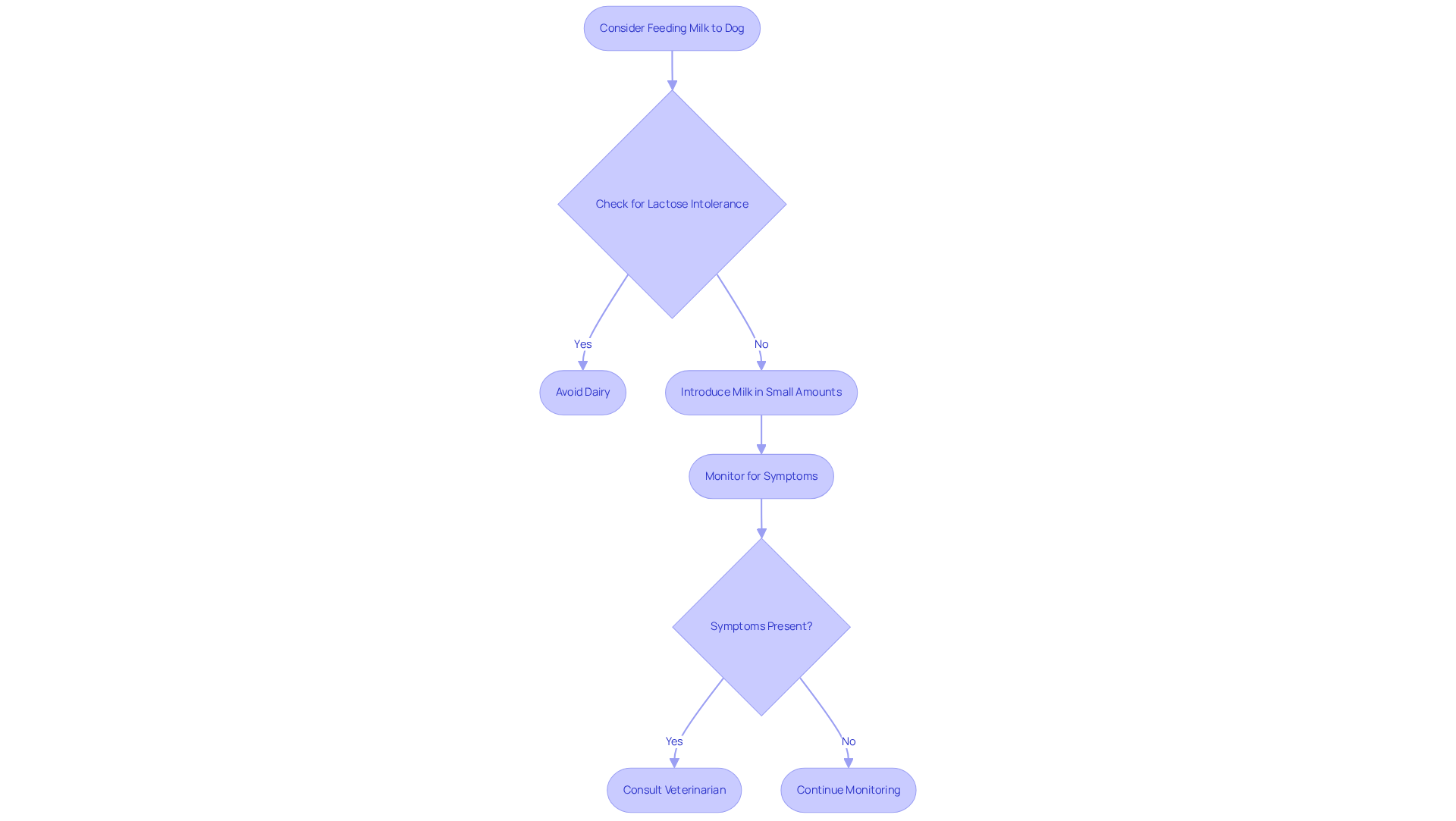
Consult Your Veterinarian: The Importance of Professional Guidance
Consulting a veterinarian before introducing milk or any new food into your dog’s diet is essential, particularly to understand if milk is good for dogs. We understand that as pet owners, you want the very best for your furry companions. Veterinarians can provide personalized advice tailored to your dog’s unique health status, dietary needs, and any pre-existing conditions. This expert guidance is crucial for making informed decisions that nurture your dog’s overall health and well-being.
As Dr. Leon Whitney beautifully expresses, ‘The care of animals is an integral part of the ethical code of veterinary medicine,’ highlighting the importance of seeking professional advice. Moreover, a recent survey revealed that 68% of animal owners wished for veterinarians to recommend a routine or maintenance diet for their pets, underscoring the need for compassionate dietary guidance.
When pet owners engage in thoughtful dietary consultations, it often leads to enhanced health outcomes, as veterinarians assist in navigating the complexities of nutrition. By prioritizing veterinary advice, you can ensure your beloved pets receive the highest standard of care. Additionally, with alarming statistics showing that 60% of felines and 56% of canines were overweight or obese in 2017, the role of veterinarians in guiding dietary choices becomes even more critical.
As Dr. Marty Becker wisely notes, ‘Veterinarians are the unsung heroes of our society,’ reflecting their unwavering dedication to the health and happiness of our pets.
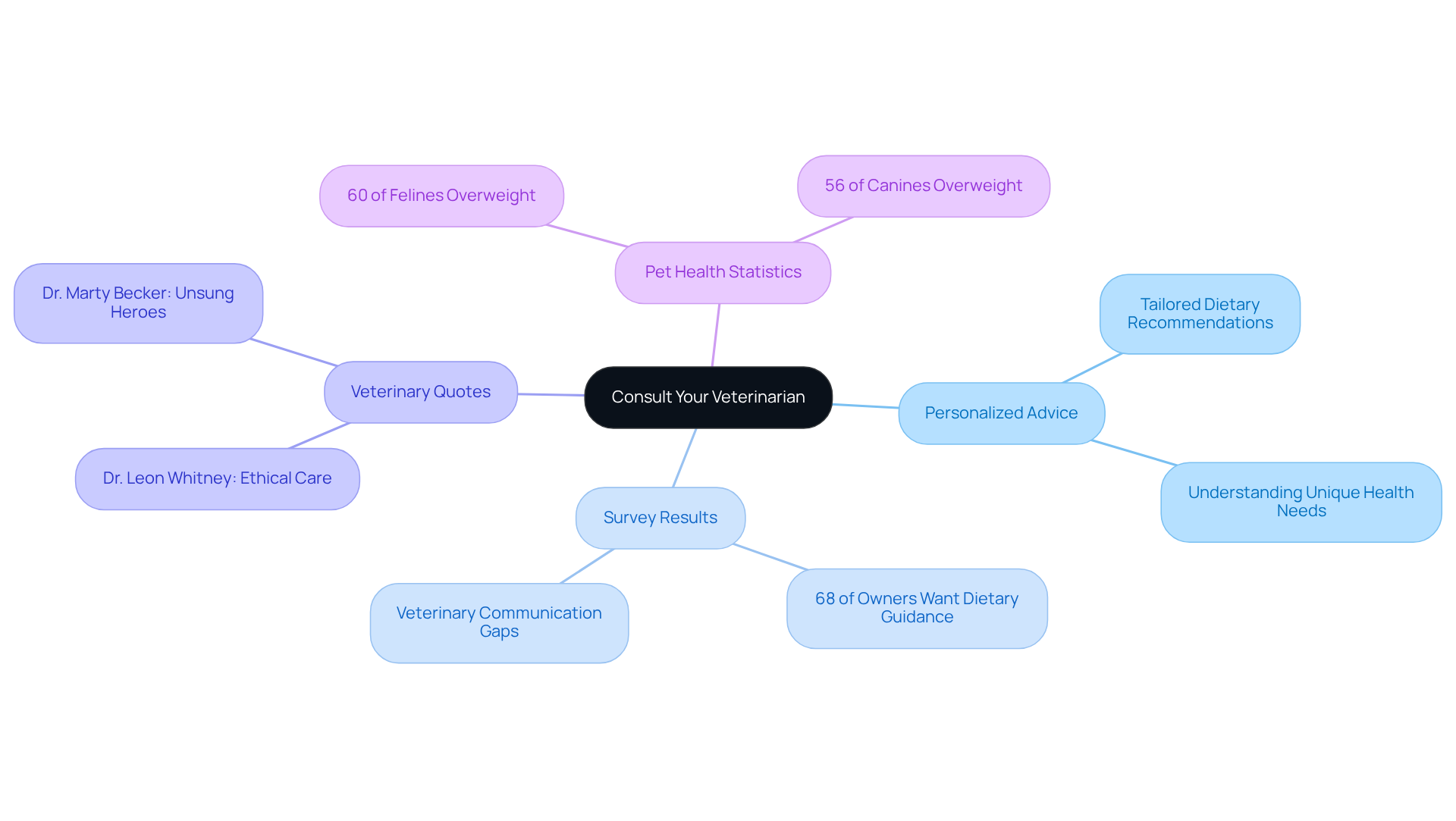
Key Takeaways on Milk for Dogs: A Summary for Pet Owners
It’s important to determine if milk is good for dogs, as it can be a delightful treat for some, depending on their individual tolerance levels. Since many dogs are lactose intolerant, it raises concerns about whether milk is good for dogs, as it can lead to uncomfortable digestive issues such as loose stools, gas, diarrhea, and vomiting when they consume milk-based products. While a few tablespoons of cow’s or goat’s milk can serve as a safe reward, it is essential to consider if milk is good for dogs, as moderation is vital to prevent health complications like obesity and pancreatitis. Recent research indicates that milk-based products are a significant cause of food intolerance in dogs, highlighting the importance of observing your pet’s reactions carefully after introducing these items into their diet.
As a caring pet owner, consulting with a veterinarian before making dietary changes is a wise step. This ensures that you are making informed decisions that prioritize your dog’s health. Interestingly, some lactose intolerant dogs may tolerate dairy products like cheese and plain yogurt, offering additional treat options. Furthermore, alternatives to dairy, such as fresh water or lactose-free yogurt, can provide similar enjoyment without the associated risks. By weighing the benefits and drawbacks of milk and introducing it gradually in small amounts, you can assess whether milk is good for dogs, thereby enhancing your dog’s overall well-being while fostering a happy and healthy lifestyle together.
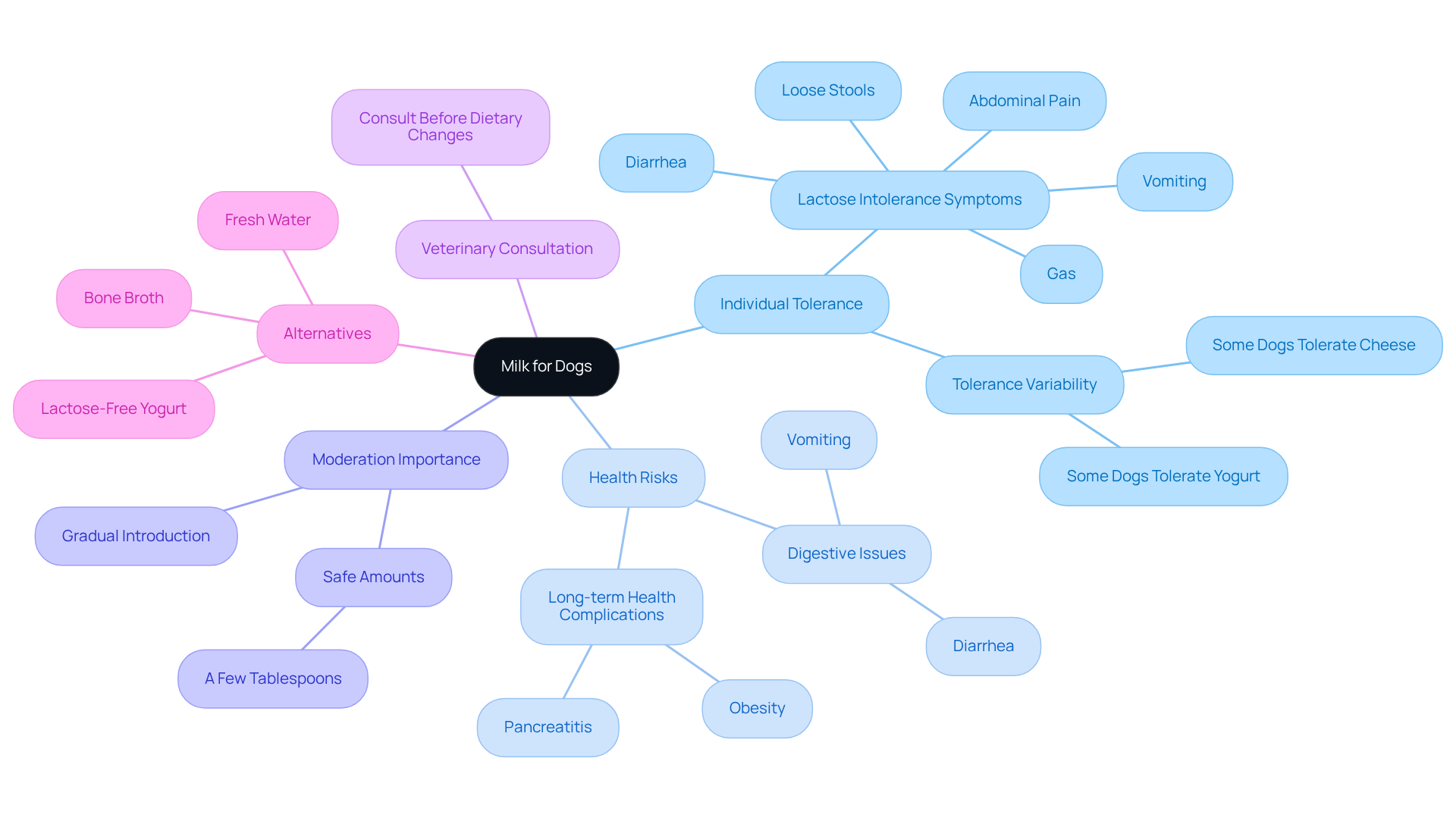
Conclusion
The exploration of whether milk is good for dogs reveals a nuanced perspective on a beloved treat for our furry companions. While many dogs may delight in the taste of milk, it is essential to understand the potential risks and benefits to ensure their health and happiness. Each dog’s individual tolerance to dairy can vary significantly, making it crucial for pet owners to approach this dietary addition with caution and care.
Throughout the article, key insights highlight the importance of moderation when introducing milk into a dog’s diet. Recognizing symptoms of lactose intolerance and understanding the nutritional benefits that milk can offer, such as protein and calcium, empowers pet owners to make informed decisions. The article also emphasizes the significance of consulting with a veterinarian to tailor dietary choices to each dog’s specific needs, ensuring a balanced and healthy diet.
Ultimately, the journey of determining if milk is good for dogs underscores the importance of attentive care and informed choices. By prioritizing your dog’s well-being and seeking professional guidance, you can navigate the complexities of their dietary preferences while fostering a healthy and joyful life together. Embracing a thoughtful approach to your pet’s nutrition can lead to a happier, healthier companion, making every treat a delightful and safe experience.
